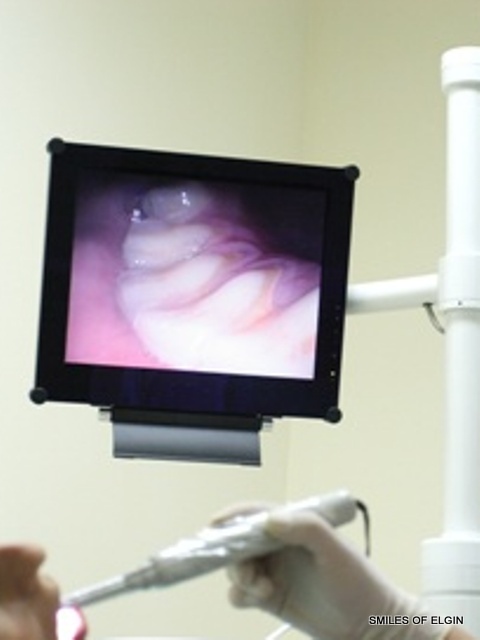1209 Dundee Avenue Elgin, IL 60120
Diagnosis
The periodontal disease is diagnosed by your Elgin dentist or dental hygienist during the periodontal examination. This is always the part of the regular dental exam.
A periodontal probe (dental instrument similar to the conventional dental probe) is used to measure the sulcus (the pocket – space between the tooth and the gums). The depth of the healthy sulcus is 1-2 mm (clinically) and 0,5 mm -1 mm (histologically) and it never bleeds. If the pockets are deeper than 2-3 mm it is a sign of pathological process that is happening in the periodontium. With the periodontal disease progression, the pockets will be deeper and can bleed.
To make the diagnosis, your dentist will need information on the depth of the sulcus (pocket), amount of bleeding, mobility of the teeth, inflammation etc. The common diagnosis are:
1. GINGIVITS – It is the first stage or the beginning of the periodontal disease. The bacteria from the plaque and their toxins irritate the gums, causing the inflammation. Gums become tender, swollen, puffy, red and they bleed when probed. At this point, there is no bone loss or weakening of the periodontal fibers.

2. PERIODONTITIS – When plaque becomes mineralized and hardened, it is called calculus or tartar. As the plaque and calculus build up, gums will start to recede from the teeth. The gums are irritated, inflamed, with pus surrounding them and they bleed easily. Some bone loss can be present. The depth of the pockets is bigger now and can make teeth loose.
3. ADVANCED PERIODONTITIS – When gum and periodontal disease are not treated at early stages, it will eventually develop into advanced periodontitis. The periodontal structures are severely damaged, there is a greater amount of bone loss, and the teeth are very loose. Gums are tender, swollen and painful, they can bleed spontaneously.
4. JUVENILE PERIODONTITIS – Is a very rare form of the periodontal disease which is characterized by a rapid destruction of the periodontal tissues in the primary dentition and sometimes even the permanent dentition. The gums are inflamed, the periodontal pockets are present and teeth are loose. Cavity frequency is low in this condition, and accumulations are almost never present. This form is considered to be genetically induced.
Because of all the stated, it is very important to have regular dental exams, since early detection is the only way to treat and prevent the periodontal disease effectively.
Good and regular oral hygiene is the key element in maintaining your oral health and this will also prevent the plaque accumulation and prevent initial stages of periodontal/ gum disease.
Office Hours
| Monday | 10:00 to 6:00 |
| Tuesday | 10:00 to 6:00 |
| Wednesday | 11:00 to 8:00 |
| Thursday | 10:00 to 6:00 |
| Friday | 10:00 to 6:00 |
| Saturday | 8:00 to 3:00 |
| Sunday | Appointment only |



Recent Comments